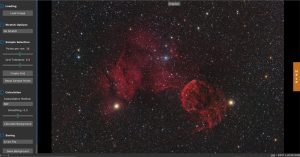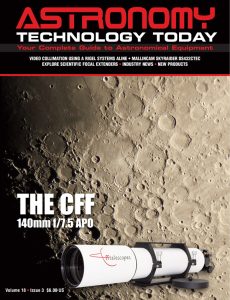GraXpert is a new open-source software program that is designed to remove gradients from astroimages. Gradients are gradual changes in brightness that are not part of an astroimage and are caused by external interference. Causes can include light pollution or incorrect or missing flat correction and can also be from also natural brightness gradients of the night sky and peculiarities of the optics used (shading in the form of a vignette).
 As the publishers note, “In order to edit deep-sky photos, it makes sense to remove such gradients from the images. Not only does it look better, but also simplifies further processing of the image. Color casts can also be removed in this way, and it generally makes sense to free the astrophoto from the amount of the sky background. In short: A gradient removal is very useful, if not mandatory.”
As the publishers note, “In order to edit deep-sky photos, it makes sense to remove such gradients from the images. Not only does it look better, but also simplifies further processing of the image. Color casts can also be removed in this way, and it generally makes sense to free the astrophoto from the amount of the sky background. In short: A gradient removal is very useful, if not mandatory.”
GaXpert is available as free open-source software that was developed exclusively for this purpose. GraXpert runs on Windows, Linux and MacOS and works stand alone, not as a plug-in for any other software. The software can be downloaded from the GitHub platform using the following link: https://github.com/Steffenhir/GraXpert/releases.
GraXpert works with linear (non-stretched images) as well as with non-linear (already stretched images). A bit depth of 16-bit as well as 32-bit is supported, as well as fits, tiff, jpeg and png file formats. Monochrome images and color images are supported.
As the publishers also note, “Gradients are best removed very early in the image processing workflow. Ideally it is done on images in linear state, i.e. directly after the stacking (in some external software) is finished and artefacts at the edges of the image have been removed by cropping. GraXpert also allows you to edit images whose brightness has already been changed, such as by a tone curve or a histogram transformation (so-called stretching). Those images are then called non-linear images.”
You can learn more about GraXpert here.
 And to make it easier for you to get the most extensive news, articles and reviews that are only available in the magazine pages of Astronomy Technology Today, we are offering a 1-year magazine subscription for only $6! Or, for an even better deal, we are offering 2 years for only $9. Click here to get these deals which only will be available for a very limited time. You can also check out a free sample issue here.
And to make it easier for you to get the most extensive news, articles and reviews that are only available in the magazine pages of Astronomy Technology Today, we are offering a 1-year magazine subscription for only $6! Or, for an even better deal, we are offering 2 years for only $9. Click here to get these deals which only will be available for a very limited time. You can also check out a free sample issue here.

